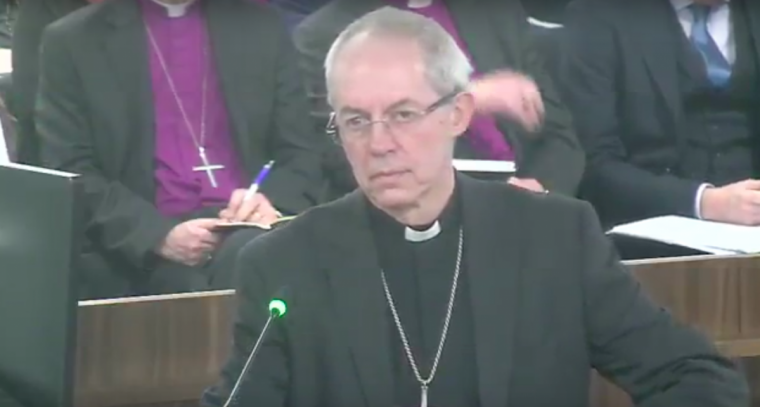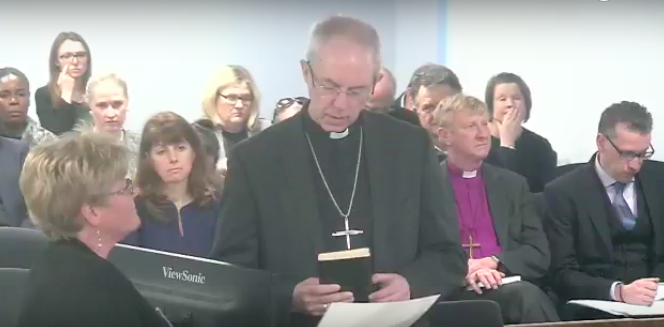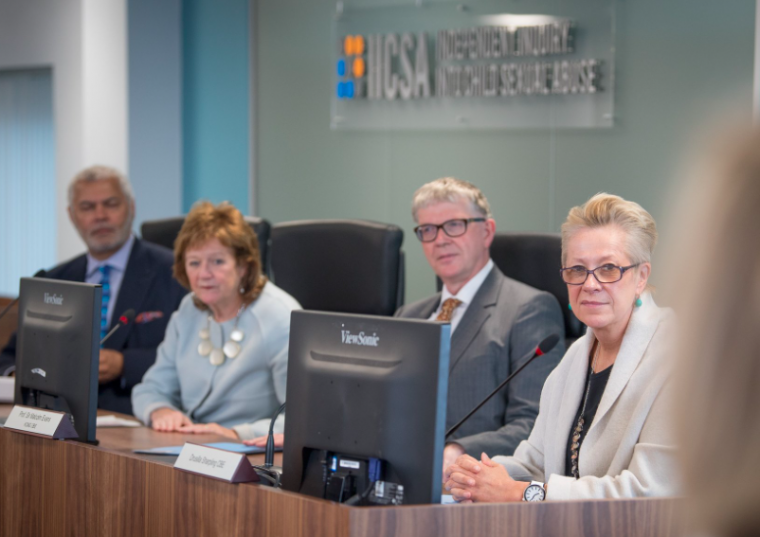Justin Welby: Child sex abuse by priests will 'destroy the Church' if it continues
The archbishop of Canterbury has warned child sex abuse by priests would 'destroy the Church' if it continued.
Justin Welby said the Church of England's current safeguarding powers to protect children 'probably do need re-looking at' as he gave evidence to the independent inquiry into child sex abuse.

Speaking in trenchant terms on the fifth anniversary of his enthronement as archbishop, Welby warned those who failed to protect children would 'answer on the day of judgement for that'.
'That probably doesn't mean much to some people here,' he told the inquiry. 'But for me I think about that every day.'
He added: 'Those who do them [children] harm would do better to have a millstone put around their neck and thrown in to the sea rather than face the judgement that God will give them.
'The reputation of the church, the reputation of a person, the reputation of an institution, is as nothing compared to the call to obey God in Jesus Christ in the way we love and care for people.
'Everything that goes against that will, in the end, destroy the Church.'
Welby is thought to be the first sitting archbishop of Canterbury summoned before a public inquiry. He is one of 50 witnesses to give evidence, either written or in person. The inquiry is coming to the end of three weeks of hearings into how the diocese of Chichester responded to allegations of child sex abuse as a case study for the wider Church of England.
Fiona Scolding QC, lead counsel to the inquiry, asked Welby what he could do to stop the 'abuse of power that we have seen parading through these doors' over the last three weeks of hearings.
Welby said all clergy and bishops were now given training in safeguarding to try and 'remove the deference and the "I'm God's gift to the Church" approach to life.'
He told the inquiry: 'Nobody can say it is not my fault.
'It is so absurd if you have heard about a problem but say "Oh well it is someone else's job to report it".
'That is not an acceptable human response let along a leadership response. If you know a child is being abused not to report it is simply wrong for every human being.'
Welby said that abusers should 'never be trusted again' as he repeated calls for an overall culture change in the Church.
'The Bible is utterly, brutally blunt about the difference between forgiveness and the consequences of sin,' he said, adding: 'If you have abused and repent genuinely, you should still go to prison.'
'Where there is something done wrong, there will be consequences,' he said.
'We know abusive behaviour tends to repeat. If someone has been an abuser, they can never be trusted again. You will never take a chance on them again.'
On the culture change needed in the Church, Welby said: 'We have to get to the point where if anything is seen that is untoward, people say this isn't right and I'm going to do something about it.'
Welby was also asked whether the Church's attitude to women's ordination and homosexuality had affected it's approach to safeguarding.

He admitted 'there is still a level of misogyny' in the Church but said the cover-up of abuse was more about power than issues of sexuality or gender.
'I think there has been a culture where some groups felt besieged and threatened. Therefore there was a loyalty to one another,' he said.
'I think it is about culture and about power and the sense of loss of power and loss of respect.'
Professor Alexis Jay, chair of the inquiry, told Welby the panel had seen a string of 'senior clergy blaming each other and other people for what did or did not occur in Chichester, sometimes in very acrimonious terms'.
Welby pointed to 'factionalism within the Church' in response and attacked a letter in the Telegraph earlier this month by supporters of former archbishop of Canterbury, George Carey. The letter said a police investigation into Carey would be against all 'biblically faithful Christianity. An attack on him is an attack on us all.'
Welby said: 'The moment you get factionalism you get failure to deal with atrocious behaviour.'
He added: 'The biggest thing we can do for hopefully many of those who will be leaders of the church in the future is to break down the factions so they can say "I relate well to those with whom I disagree".
'If we can disagree well we will then be less inclined to cover up or side with "my own side" whatever they have done.'
Welby came close to tears as he was asked what he had learnt about the Church of England from the three weeks of hearings.

'I have learnt to be ashamed again of the Church,' he said after a lengthy pause.
'You can't read the transcripts, you can't read the evidence statements, without being moved. Or at least you shouldn't be able to.
'The Church does wonderful, wonderful things you know across the country. The most stressful job in the church is to be a parish priest and to be good parish priest. And that a minority, a small minority, have betrayed that is horrifying.
He added: 'I have seen the insanity of clericalism and of a deferential culture and how we have to struggle against that.
'All institutions do it. But we are not all institutions. We are the Church.'
He went on: 'You can apologise and apologise to survivors. I would want to put on record again how, I don't know how to express it adequately, how appalled I am and how ashamed I am of the Church for what it did to those survivors who are coping with this.
'Apologies are fine but we have got to find ways of making it different and we have go to do it as quickly as we can. And that is top of my priority list.'











